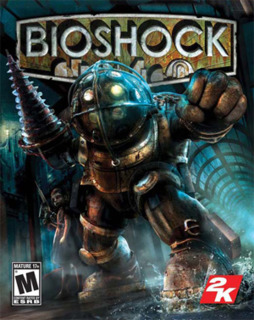BioShock is what I like to think of as a great graphical translation of what Ayn Rand would have seen in her nightmares, were she to have any imagination whatsoever or have lived in the time of video games. Despite the fact that I hate her fiction, other than Anthem, the themes by which she shaped her personality all play a strongly woven role in the narrative of Rapture, a somewhat minarchist scientific utopia under the ocean where citizens are allowed to live free in pursuit of higher goals like science and self-realization.
On top of being heavily influenced by one of last centuries most prominent, and outspoken, personalities, it's also a spiritual successor -perhaps even a re-imagining - to one of the very pillars of modern video games: System Shock, made by Ken Levine and many of the same people at what was formerly Looking Glass Studios in the 90's, but stuck in legal purgatory - never to return - thanks to the publisher, Electronic Arts, and some legal firm that believes blackmail is a legitimate way to profit off of the IP. Considering System Shock 2 is probably the single most legendary game in all of PC gaming history - perhaps tying Mario for the honor overall - the very fact that BioShock has even a passing relation to it makes it worth checking out. Fortunately, BioShock is not just popular by association but on its own merits, and like its parents Deus Ex, Half-Life, and System Shock, it is certainly not a "Doom clone." as newly implemented Steam tags will try to tell you.
Rapture, the labyrinthine underwater utopia, is an endearing setting with a personality of its own and once you play the game, it will be permanently etched in your memory. Every last detail of the art deco city is simply beautiful, whether architecturally or just graphically. The graphics show their age, somewhat, as this was before the advent of DirectX 10 and the great strides it made in liquids and other non-standard materials when it comes to light - you can tell when you encounter entirely frozen areas like Fontaine's store that the ice kind of looks silly - but the game is simply beautiful regardless. Rapture creaks and groans, leaks spring out of pipes, and the city looks convincingly like it is actually under hundreds of feet of crushing ocean water - the mess of pipes and steam contrasting menacingly with what otherwise seems to be a city stuck in the 50s. Every last detail was taken care of, down to the insane messages scrawled in blood on the walls and floors, the traps devised by people who have gone insane, and even the characters themselves - most of which tell a story through their ramblings or questlines if you are willing to listen.
Many of System Shock's nuances found their way in to BioShock, such as customizing your plasmid powers (which in SS2 were your psionic powers), upgrading your weapons, hacking computer and other electronic systems, the good old wrench, and even the fact that you can return at will to previous areas and still encounter enemies there. The game plays very much the same, right down to the distant and duplicitous "ally" who ostensibly guides you to safety with your best interests at heart, all the while simply manipulating you for their own means. Although, admittedly Andrew Ryan's reveal as the villain was much more "WTF!?" than SHODANs, because his Irish sincerity made you feel he was genuine and trustworthy. It wasn't just me, right?
Some hardcore System Shock fans take issue with the lack of depth in the character customization system in BioShock, considering that in SS2 you controlled every last facet of your character's development down to the individual stat's numbers. However, the truth is that in it's predecessor, that deep complexity rarely amounted to anything more than superficial and numerical bonuses to your abilities. Just like plasmids in BioShock and Vigors in Infinite, many of your psionic powers and other abilities only served as much purpose as you forced them to. In Shock 2 they often controlled what weapons you could use, but you really didn't need heavy artillery in the game until it was nearly over, meaning several of the weapons skills - for example - were just there for variety.
Overall, BioShock created a franchise vastly more successful - in terms of sales and mainstream appeal - than it's predecessor, which is what Irrational intended. The game is a masterpiece, providing ample thrills, chills, character expose's, an interesting variety of combat and moral choices - not to mention a lack of choices, an eternal setting that has now featured in two full games and an expansion for a third. Let's not forget a duo of two of the creepiest, most unsettling characters in all of gaming - the Big Daddy and Little Sister. It may never be as deep and robust as System Shock 2, but that may be a fate the franchise has to suffer to stay alive.

